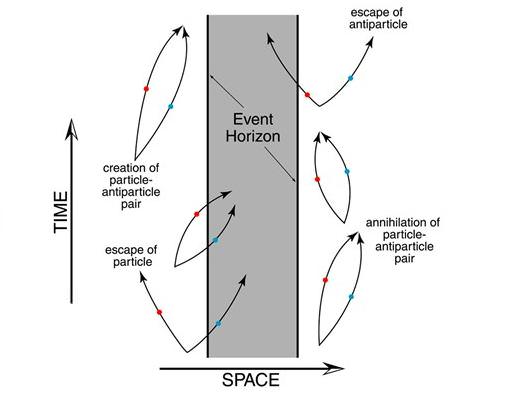Hawking radiation is one of the most famous physical processes in astronomy. Through Hawking radiation, the mass, and energy of a black hole escape over time. It’s a brilliant theory, and it means that black holes have a finite lifetime. If Hawking radiation is true. Because as famous as it is, Hawking radiation is unproven. The theory is not even theoretically proven.
Hawking proposed the idea of black hole radiation while studying ways to integrate Einstein’s classical theory of gravity with the quantum theory of atoms and light. We don’t have a fully quantum theory of gravity, so Hawking used a semiclassical approach, where matter is treated as quantum while gravity is treated classically. From this, Hawking showed that quantum fields could escape the event horizon of a black hole.
The Hawking process is typically represented by virtual pair production. One approach to quantum physics argues that within the vacuum of empty space pairs of particles can appear and disappear spontaneously due to Heisenberg’s uncertainty principle. The “fuzziness” of quantum theory means that space can never be truly empty. In empty regions of space, these particles don’t have any real effect and thus are virtual particles. But near the event horizon of a black hole one member of a virtual pair could be trapped by the black hole, leaving the other to escape as real radiation.
The virtual particle visualization is appealing, but it isn’t without its problems. Hawking’s approach can lead to things such as the firewall paradox, where the region near a black hole event horizon should be both empty and ablaze with realized virtual particles. Without a fully quantum approach to gravity, we can’t resolve these paradoxes easily.
 Hawking radiation near an event horizon. Credit: NAU.
Hawking radiation near an event horizon. Credit: NAU.
There are, however, other semi-classical approaches to gravity than the one Hawking used. Most of them also predict black holes will radiate, but argue it from a different approach. For example, one approach is to look at the matter trapped within a black hole as a quantum wavefunction bound by intense gravity. Since the gravitational pull of a black hole is never infinite at the event horizon, the wavefunction is essentially bound within a finite container. Through a process called quantum tunneling, quantum objects can escape any finite container in time. So, you get black hole radiation without the need for virtual particles.
This is where a new study comes in. For this work, the team looked at a different formulation of Hawking radiation, somewhat similar to the wavefunction approach. They found that when it comes to Hawking radiation, the event horizon of a black hole isn’t particularly special. Any concentrated mass, from neutron stars to pet rocks, has a gravitational well that acts like a finite container. So quantum particles can always escape. This has long been known, but what the team showed was that if you express this in terms of Hawking’s virtual particles, then virtual particles can become real near any mass, not just black holes. Black holes are by far the most effective generators of Hawking radiation, but if you wait long enough, even your favorite rock will radiate its mass away.
This model doesn’t change our understanding of black holes, but it could have significant consequences for long-term cosmology. If everything disappears in a poof of radiation given enough time, then the universe will fade into a cold sea of radiation.
Reference: Wondrak, Michael F., Walter D. van Suijlekom, and Heino Falcke. “Gravitational Pair Production and Black Hole Evaporation.” Physical Review Letters 130.22 (2023): 221502.

